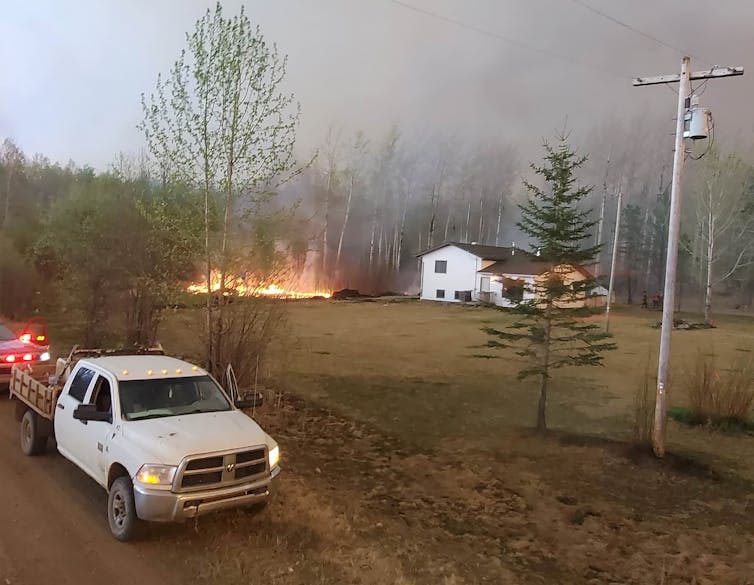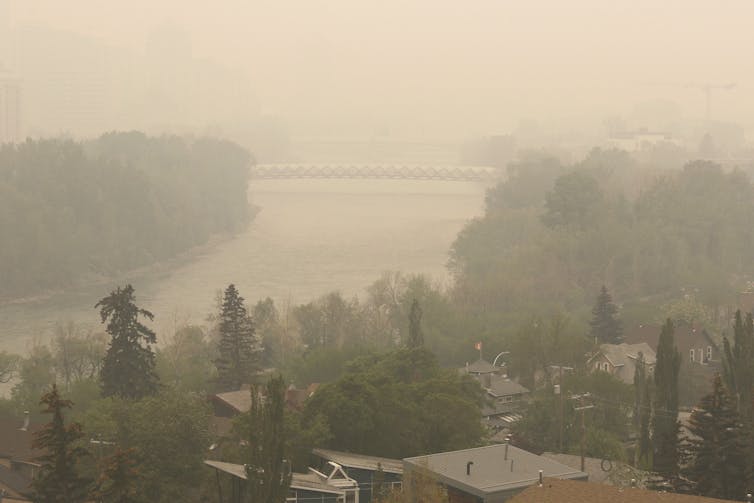In the wake of wildfire outbreaks tearing through Alberta, which have destroyed infrastructure, homes and razed an estimated one million or more hectares of forest, the province recently announced only students evacuated for 10 days would be exempted from writing Grade 12 diploma examinations.
While public attention is understandably focused on the immediate impacts of the wildfires on communities, including the urgent efforts of schools to cope, the announcement was also out of touch with widespread existential concern among students for their futures.
As students, principals and teachers shared with us, the arbitrary 10-day window failed to recognize the widespread anxiety and uncertainty across central and northern Alberta triggered by the unprecedented wildfires and on the heels of the COVID-19 pandemic.
This decision reflects a legacy of faltering efforts to reform Alberta’s kindergarten to Grade 12 currriculum and assessment programs.
Read more: Teachers need bolder action from our school boards to educate in and for a climate emergency
As education researchers and teachers respectively at the university (J-C) and high-school (Melissa) levels, we are urgently reminded to return to foundational insights about teaching.
To offer students something vitally relevant to their lives, we can’t view curricula as just content to be consumed (and tested on).
As education scholar Kent den Heyer has underscored, the “content,” of learning exists in the daily encounters between the student, the school subject and society. With this in mind, teachers open possibilities for generative classroom encounters which are a point of departure for learning rather than the destination.

Complicated conversations needed
Alberta’s wildfires invite policymakers to recognize that given our global climate emergency, classrooms ought to be places to host “complicated conversations.”
The province’s policy announcement on exams stands in stark contrast to what we have heard and seen in recent days about the conflicted lived experience of students affected by the fires.
One of the authors of this story, Melissa, teaches secondary school in Drayton Valley, one of the hubs of Alberta’s energy sector, about an hour’s drive south-west of Edmonton. Students in her class reflected sombrely on their fire evacuation experiences.
Talking about terror
The research of Cathryn van Kessel, Kent den Heyer and Jeff Schimel, which draws on their combined expertise in education and psychology, can help teachers to guide classroom discussions through practising what’s known as terror management theory.
Terror management theory offers insight and strategies to understand cataclysmic events and the ways that death and reminders of our mortality affect people’s sense of self-esteem in relation to their cultural worldviews.
On first blush this might seem both conceptually and emotionally overwhelming for young people.

Yet research in schools is proving that applying such an approach with students is possible to engage tectonic events related to environmental collapse, the impacts and legacies of Indian Residential Schools and facing genocide and colonialism in Canada, and experiences of personal loss in the COVID-19 pandemic.
Terror management theory in the classroom
Applying terror management theory in the classroom provided Melissa with language to engage the most intense emotions triggered by the immediate and larger climate change crises presented by the wildfires and the threat climate change poses to our “business as usual” worldviews.
The existential cracks triggered by the global environmental crisis for Canadian young people was highlighted in a recent survey documenting growing emotional and psychological impacts: 39 per cent of 1,000 surveyed people across the country, aged 16-25, considered their probable future world so bleak they would hesitate to have children.
Teachable moments
In Melissa’s high-school class, relying on terror management theory allowed her to anticipate a “teachable moment” related to the study of citizenship in a democratic society. She offered this question to students:
To what extent has the wildfire not interrupted — but instead enriched — your learning about what it means to be a citizen?
Many students were frustrated and troubled by disinformation on social media and confusion it generated. Students also reflected on how worry about their grades is entangled with navigating the wildfire threats.
We became aware of conflicted feelings students shared that described feeling somewhat guilty about hoping the evacuation would continue so that they would not have to write diploma exams.
This reminded us of the challenges teachers face in achieving the lofty goals articulated in the government’s Framework for Student Learning “to develop competencies for engaged thinkers and ethical citizens with an entrepreneurial spirit.”
We need a curriculum that recognizes the multiplicity of students’ voices and interwoven tensions and contradictions that shape students’ daily lives and how they anticipate their futures.
As UNESCO policy analyst Riel Miller notes, since curriculum programs — like any product of government policy — are inevitably driven by assumptions of what we anticipate and the values informing this, a key project of education should be creating spaces where we continually “question the sources of our imagination.”

Looming threats and time for students
Even though the immediate threat to Drayton Valley students and their community has receded, the possibility of evacuation still looms for them and many other students and families when the typical fire season is just beginning.
With a provincial election looming and with a divided electorate, it remains unclear how any provincial government might navigate the highly controversial and contested curriculum rewriting process.
As the province and educators face this task, we must consider current and previous fire and flood crises in the context of an increasingly volatile, uncertain, complex and ambiguous world as an opportunity to help us rethink what success in school looks like and what it means to be a citizen.
For schools impacted by the wildfires, the best efforts of teachers to cover the curriculum under additional pressure of lost instructional time due to evacuations is one more indication of needed changes. We need a curriculum that has time for students — time to engage their questions and the sources of their imagined futures.
The authors do not work for, consult, own shares in or receive funding from any company or organization that would benefit from this article, and have disclosed no relevant affiliations beyond their academic appointment.
This article was originally published on The Conversation. Read the original article.







